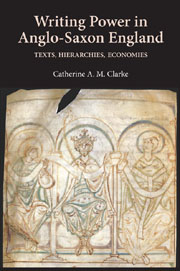Book contents
- Frontmatter
- Contents
- Acknowledgements
- Abbreviations
- Introduction
- 1 Order and Interlace: the Guthlac Poems of the Exeter Book
- 2 Sites of Economy: Power and Reckoning in the Poetic Epitaphs of the Anglo-Saxon Chronicle
- 3 ‘Absens ero … presens ero’: Writing the Absent Patron
- 4 Power and Performance: Authors and Patrons in late Anglo-Saxon Texts
- 5 Remembering Anglo-Saxon Patronage: the Libellus Æthelwoldi Episcopi and its Contexts
- Afterword
- Bibliography
- Index
- ANGLO-SAXON STUDIES
1 - Order and Interlace: the Guthlac Poems of the Exeter Book
Published online by Cambridge University Press: 05 February 2013
- Frontmatter
- Contents
- Acknowledgements
- Abbreviations
- Introduction
- 1 Order and Interlace: the Guthlac Poems of the Exeter Book
- 2 Sites of Economy: Power and Reckoning in the Poetic Epitaphs of the Anglo-Saxon Chronicle
- 3 ‘Absens ero … presens ero’: Writing the Absent Patron
- 4 Power and Performance: Authors and Patrons in late Anglo-Saxon Texts
- 5 Remembering Anglo-Saxon Patronage: the Libellus Æthelwoldi Episcopi and its Contexts
- Afterword
- Bibliography
- Index
- ANGLO-SAXON STUDIES
Summary
The two Guthlac poems of the Exeter Book form differing verse explorations of aspects of the life of the eponymous late seventh- to early eighth-century ascetic saint who settled in the East Anglian fenland, with associated homiletic material. Throughout the texts there is a prominent interest in spiritual patronage, and in the structures of relationship, authority and dependency between individuals within a spiritual community. The particular relationships presented within these poems – such as those between Guthlac and his patron saint Bartholomew (especially in Guthlac A), or between Guthlac and his disciple Beccel (Guthlac B) – are crucial elements within the texts' strategy of moving between the specific and the universal, using elements from the life of Guthlac to offer models of Christian virtue and relationship for contemplation and imitation. The Guthlac poems show an acute interest in hierarchy and rank, through which power and authority are ordered, but also in economies of inter-dependence and reciprocity. Whilst spiritual relationships are located within a strictly hierarchical system, the use of specific discourses of friendship, kinship and affectivity allows the apparent transcendence of strict hierarchy and enables individuals to enjoy privileged, intimate affiliations which seem to collapse hierarchical distance. This chapter will explore the inter-play of these conceptual and rhetorical idioms within the Guthlac poems, examining the texts' representational and linguistic strategies, their possible functions within their historical and cultural contexts, and the elements of tension or euphemism inherent in their depictions of power.
- Type
- Chapter
- Information
- Writing Power in Anglo-Saxon EnglandTexts, Hierarchies, Economies, pp. 11 - 43Publisher: Boydell & BrewerPrint publication year: 2012



